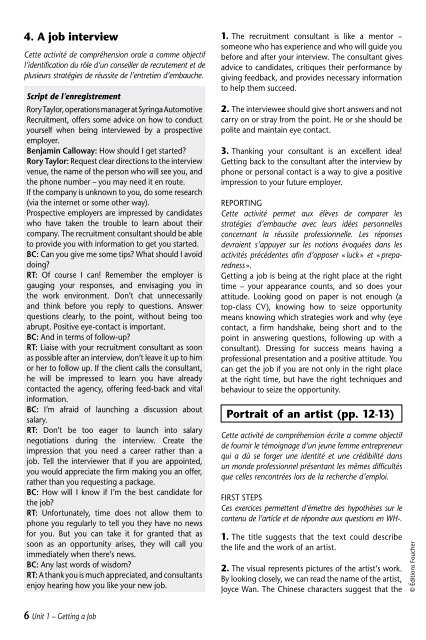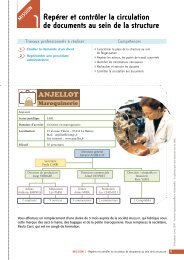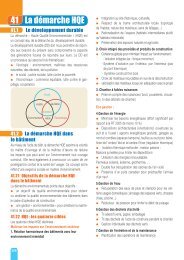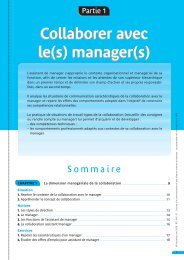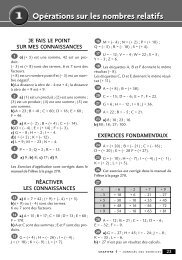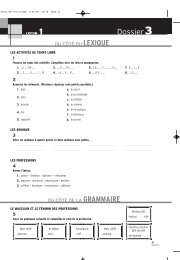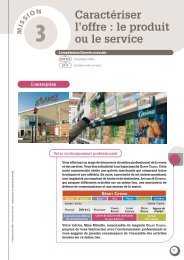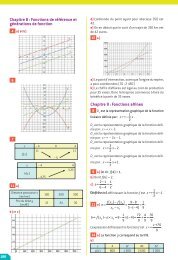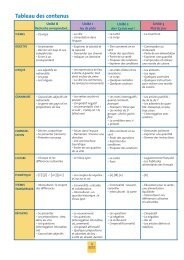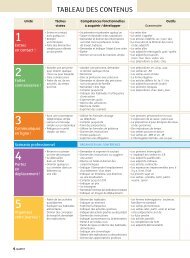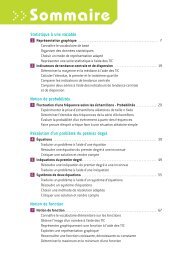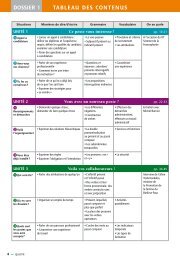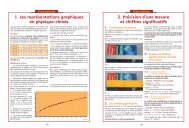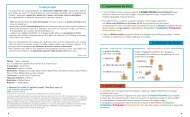GUIDE PÉDAGOGIQUE - Hachette
GUIDE PÉDAGOGIQUE - Hachette
GUIDE PÉDAGOGIQUE - Hachette
Create successful ePaper yourself
Turn your PDF publications into a flip-book with our unique Google optimized e-Paper software.
4. A job interview<br />
Cette activité de compréhension orale a comme objectif<br />
l’identification du rôle d’un conseiller de recrutement et de<br />
plusieurs stratégies de réussite de l’entretien d’embauche.<br />
Script de l’enregistrement<br />
Rory Taylor, operations manager at Syringa Automotive<br />
Recruitment, offers some advice on how to conduct<br />
yourself when being interviewed by a prospective<br />
employer.<br />
Benjamin Calloway: How should I get started?<br />
Rory Taylor: Request clear directions to the interview<br />
venue, the name of the person who will see you, and<br />
the phone number – you may need it en route.<br />
If the company is unknown to you, do some research<br />
(via the internet or some other way).<br />
Prospective employers are impressed by candidates<br />
who have taken the trouble to learn about their<br />
company. The recruitment consultant should be able<br />
to provide you with information to get you started.<br />
BC: Can you give me some tips? What should I avoid<br />
doing?<br />
RT: Of course I can! Remember the employer is<br />
gauging your responses, and envisaging you in<br />
the work environment. Don’t chat unnecessarily<br />
and think before you reply to questions. Answer<br />
questions clearly, to the point, without being too<br />
abrupt. Positive eye-contact is important.<br />
BC: And in terms of follow-up?<br />
RT: Liaise with your recruitment consultant as soon<br />
as possible after an interview, don’t leave it up to him<br />
or her to follow up. If the client calls the consultant,<br />
he will be impressed to learn you have already<br />
contacted the agency, offering feed-back and vital<br />
information.<br />
BC: I’m afraid of launching a discussion about<br />
salary.<br />
RT: Don’t be too eager to launch into salary<br />
negotiations during the interview. Create the<br />
impression that you need a career rather than a<br />
job. Tell the interviewer that if you are appointed,<br />
you would appreciate the firm making you an offer,<br />
rather than you requesting a package.<br />
BC: How will I know if I’m the best candidate for<br />
the job?<br />
RT: Unfortunately, time does not allow them to<br />
phone you regularly to tell you they have no news<br />
for you. But you can take it for granted that as<br />
soon as an opportunity arises, they will call you<br />
immediately when there’s news.<br />
BC: Any last words of wisdom?<br />
RT: A thank you is much appreciated, and consultants<br />
enjoy hearing how you like your new job.<br />
6 Unit 1 – Getting a Job<br />
1. The recruitment consultant is like a mentor –<br />
someone who has experience and who will guide you<br />
before and after your interview. The consultant gives<br />
advice to candidates, critiques their performance by<br />
giving feedback, and provides necessary information<br />
to help them succeed.<br />
2. The interviewee should give short answers and not<br />
carry on or stray from the point. He or she should be<br />
polite and maintain eye contact.<br />
3. Thanking your consultant is an excellent idea!<br />
Getting back to the consultant after the interview by<br />
phone or personal contact is a way to give a positive<br />
impression to your future employer.<br />
REPORTING<br />
Cette activité permet aux élèves de comparer les<br />
stra tégies d’embauche avec leurs idées personnelles<br />
concernant la réussite professionnelle. Les réponses<br />
devraient s’appuyer sur les notions évoquées dans les<br />
activités précédentes afin d’opposer « luck » et « preparedness<br />
».<br />
Getting a job is being at the right place at the right<br />
time – your appearance counts, and so does your<br />
attitude. Looking good on paper is not enough (a<br />
top-class CV), knowing how to seize opportunity<br />
means knowing which strategies work and why (eye<br />
contact, a firm handshake, being short and to the<br />
point in answering questions, following up with a<br />
consultant). Dressing for success means having a<br />
professional presentation and a positive attitude. You<br />
can get the job if you are not only in the right place<br />
at the right time, but have the right techniques and<br />
behaviour to seize the opportunity.<br />
portrait of an artist (pp. 12-13)<br />
Cette activité de compréhension écrite a comme objectif<br />
de fournir le témoignage d’un jeune femme entrepreneur<br />
qui a dû se forger une identité et une crédibilité dans<br />
un monde professionnel présentant les mêmes difficultés<br />
que celles rencontrées lors de la recherche d’emploi.<br />
FIRST STEPS<br />
Ces exercices permettent d’émettre des hypothèses sur le<br />
contenu de l’article et de répondre aux questions en WH-.<br />
1. The title suggests that the text could describe<br />
the life and the work of an artist.<br />
2. The visual represents pictures of the artist’s work.<br />
By looking closely, we can read the name of the artist,<br />
Joyce Wan. The Chinese characters suggest that the<br />
© Éditions Foucher


